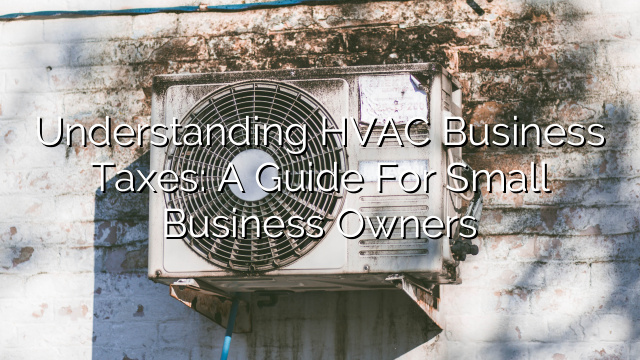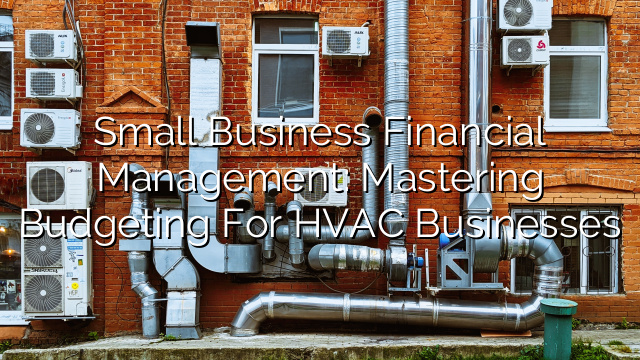Introduction
Running a small HVAC (heating, ventilation, and air conditioning) business can be challenging, especially when it comes to managing your taxes. Whether you’re just starting out or have been in business for a while, understanding your tax obligations is crucial to maintaining a healthy financial foundation. In this guide, we will provide an overview of the different types of taxes that HVAC business owners typically encounter and offer some tips on how to stay organized and compliant.
Understanding Business Taxes
As a small business owner, it’s important to be aware of the different types of taxes you’ll likely encounter. Here are some of the most common taxes that HVAC business owners should be familiar with:
- Income taxes: Just like individuals, businesses are required to pay income taxes on their profits. The specific tax rate you’ll be subject to will depend on your business structure and earnings.
- Self-employment taxes: If you operate your HVAC business as a sole proprietorship or as a single-member LLC, you’ll be responsible for paying self-employment taxes. These taxes cover Social Security and Medicare contributions, which are typically withheld from a regular employee’s paycheck.
- Employment taxes: If you have employees, you’ll need to withhold federal and state income taxes, Social Security taxes, and Medicare taxes from their wages. You’ll also be responsible for paying the employer’s portion of these taxes.
- Sales taxes: Depending on your location, you may be required to collect and remit sales taxes on the services you provide. Sales tax rates and regulations can vary by state and locality, so it’s important to research and understand your obligations.
- Property taxes: If you own the building or land where your HVAC business is located, you may be subject to property taxes. These taxes are typically assessed by local governments and vary based on the value of the property.
Tips for Staying Organized
Keeping track of your business expenses and income is essential for accurate tax reporting and can also help you maximize deductions. Here are some tips to help you stay organized:
- Maintain separate business accounts: Open a separate bank account and credit card specifically for your HVAC business. This will make it easier to track business-related transactions and separate them from personal expenses.
- Use accounting software: Consider using accounting software, such as QuickBooks or Xero, to help manage your finances. These tools can automate many tasks, such as tracking income and expenses, generating financial reports, and even filing taxes.
- Keep detailed records: Save all receipts, invoices, and other supporting documents for your business expenses. This will make it easier to substantiate your deductions and provide documentation in case of an audit.
- Create a filing system: Organize your paperwork by creating a filing system that works for you. You can use physical folders or electronic folders on your computer to store and categorize your documents.
- Stay up to date: Keep track of important tax deadlines and any changes to tax laws that may affect your HVAC business. The IRS website and local tax authorities are good resources for the latest information.
Frequently Asked Questions
Q: Do I need to collect sales tax for HVAC services?
A: Sales tax requirements vary by jurisdiction. Some states may exempt certain services, while others may require sales tax to be collected on all services. Be sure to check the sales tax regulations in your state and consult with a tax professional if you have any questions.
Q: Can I deduct the cost of my HVAC equipment as a business expense?
A: Yes, the cost of HVAC equipment used for your business can usually be deducted as a business expense. However, it’s important to consult with a tax professional to determine the specific tax treatment and any limitations or restrictions that may apply.
Q: Should I hire an accountant to help with my business taxes?
A: While it’s possible to handle your business taxes on your own, hiring an accountant can provide several benefits. Accountants are trained to navigate the complexities of tax laws and can help ensure that you’re taking advantage of all available deductions and credits. They can also provide guidance on tax planning strategies and help you avoid costly mistakes.
Q: What happens if I don’t pay my business taxes on time?
A: Failing to pay your business taxes on time can result in penalties and interest charges. The specific consequences will depend on the type and amount of tax owed. It’s important to communicate with the IRS or your local tax authority if you’re unable to meet your tax obligations to explore payment options and potentially avoid additional charges.
Q: Is it possible to reduce my tax liability as an HVAC business owner?
A: Yes, there are several strategies that HVAC business owners can employ to help reduce their tax liability. For example, taking advantage of deductions for business expenses, maximizing retirement contributions, and implementing tax-efficient business structures can all help minimize tax obligations. Consulting with a tax professional is highly recommended to ensure you’re utilizing all available tax-saving strategies.
Conclusion
Understanding and managing your HVAC business taxes is essential to the success and profitability of your company. By familiarizing yourself with the different types of taxes you’re likely to encounter, staying organized, and seeking professional guidance when needed, you can ensure compliance with tax regulations while minimizing your tax burden. Remember, tax laws can change, so it’s important to stay informed and adapt your tax strategies accordingly. Investing the time and effort to properly handle your taxes can ultimately save you money and contribute to the long-term success of your HVAC business.







